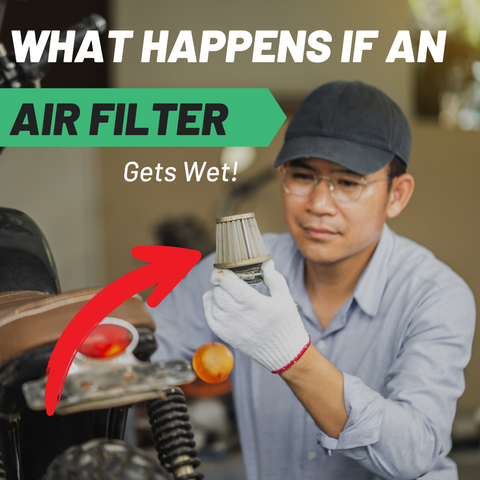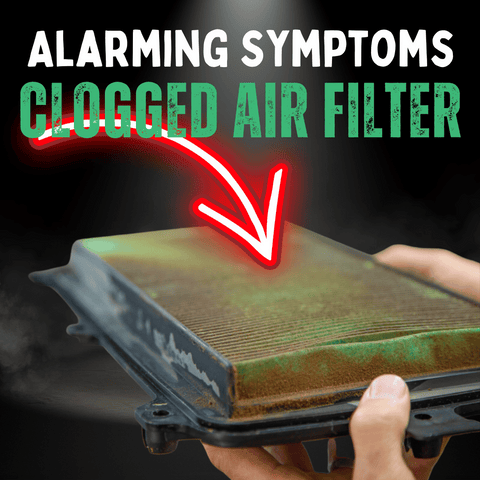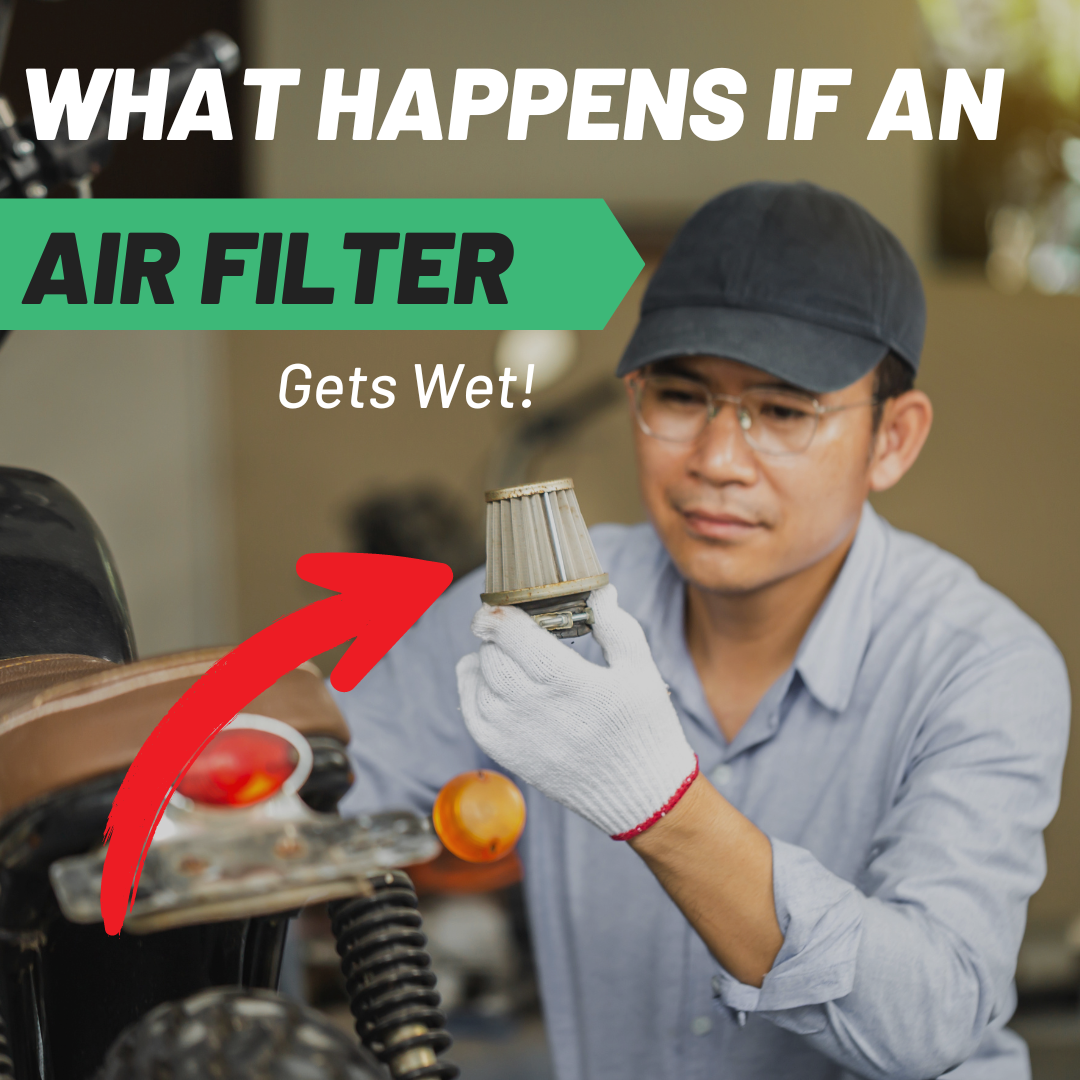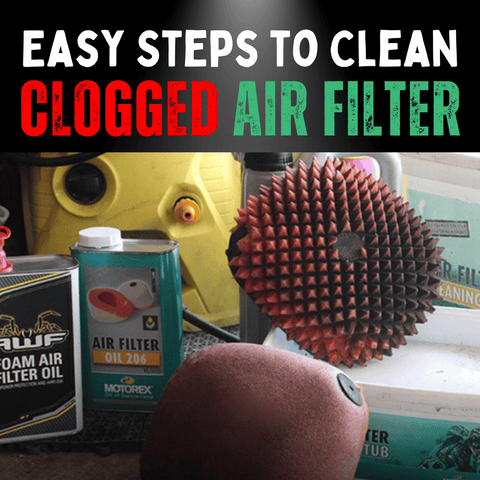Published: 18 May 2023
Updated: 24 March 2025
Your powersports vehicle—be it a motorcycle, ATV, or side-by-side—relies on a healthy engine.
But what keeps it running cleanly? 
Dust, debris, and insects constantly threaten your engine, potentially causing performance drops or costly repairs.
You might focus on oil changes, but the air filter—an unsung hero—plays a vital role in protecting your engine. Learn more about air filters.
Keeping your air filter clean and dry ensures peak engine efficiency—let’s explore why.
Related: 5 Easy Steps to Clean Your Clogged Air Filter
Types of Air Filters
Air filters come in two main types: reusable and disposable.
Reusable Air Filters
Found in off-road vehicles like ATVs, reusable filters (foam or fabric) can be cleaned and oiled for optimal performance.
Disposable Air Filters
Common in road bikes, disposable paper filters must be replaced when dirty—they can’t be cleaned.
| Filter Type | Pros | Cons |
|---|---|---|
| Paper | Cheap, effective | Not reusable, not water-resistant |
| Cotton | Reusable, high performance | Needs specific cleaning, pricier |
| Foam | Great for off-roading, reusable | Less effective for small particles |
What Happens When an Air Filter Gets Wet?
Engine Choking
A wet filter restricts airflow, causing a rich fuel mix that chokes the engine.
Related: Should You Run With The Choke Open Or Closed?
Reduced Airflow
Water clogs the filter’s pores, lowering engine performance.
Related: Alarming Symptoms of a Clogged Air Filter

Contaminant Buildup
Moisture makes dust stick, further blocking airflow and efficiency.
Air Pathway Disruption
Water can close off air pathways, leading to poor engine performance.
Signs of a Wet Air Filter
Sputtering & Misfiring
A wet filter can cause your engine to sputter or misfire during ignition.
Rough Idling
Hard starts or rough idling often signal a wet filter disrupting air-fuel balance.
Gasoline Smell
A strong fuel smell indicates a rich mix due to poor airflow.
Preventing Wet Air Filters

Proper Storage
- Store filters in a cool, dry place with silica gel to absorb moisture.
Handling & Installation
- Use clean, dry hands; ensure the housing is dry before installing.
Weather Protection
- Use a pre-filter or snorkel system for off-road vehicles in wet conditions.
Regular Inspections
- Check for dampness or discoloration after wet rides.
Drying Tips
- Air dry damp filters completely—avoid heat sources like hair dryers.
Maintenance Tips
Reusable Filters: Clean with filter cleaner, rinse, air dry (24 hours), and apply filter oil evenly.
Disposable Filters: Replace as per manufacturer guidelines—don’t attempt to clean.
Common Mistakes to Avoid with Air Filters
Avoid these pitfalls to keep your air filter and engine in top shape.
| Mistake | Consequence | Solution |
|---|---|---|
| Using wrong oil | Poor filtration, engine damage | Use manufacturer-recommended filter oil |
| Neglecting replacement | Reduced efficiency, engine wear | Replace every 15,000-30,000 miles |
| Improper cleaning | Damaged filter, reduced effectiveness | Use approved cleaning solutions |
| Over-oiling reusable filters | Excess oil in engine, sensor issues | Apply oil sparingly, wipe excess |
| Incorrect installation | Air leaks, unfiltered air in engine | Ensure proper fit and seal |
In Summary
A clean, dry air filter is key to your engine’s performance and longevity.
Regular maintenance ensures smooth rides and avoids costly repairs.
FAQ’s
Can I use my vehicle with a slightly wet air filter?
It may run, but even slight dampness can reduce airflow and harm the engine over time—dry or replace it.
Can I clean a disposable air filter?
No, disposable paper filters can’t be cleaned—replace them when dirty or wet.
How often should I replace my air filter?
Typically every 12,000-15,000 miles, but more often in dusty conditions—check your manual.
What oil should I use for a reusable air filter?
Use filter-specific oil (foam or fabric type) to trap particles without blocking airflow.
Can a wet air filter damage the engine?
Yes, it can cause a rich fuel mix, reducing efficiency and damaging components over time.
Ready to Ride? 🚀
Loved our 2025 guide on air filter maintenance?
Explore more at RiiRoo.com or chat live with us!






Share:
How To Inspect Motorcycle Tyres
How Much Does a Go-Kart Cost in the UK? 2025 Prices for Kids and Adults